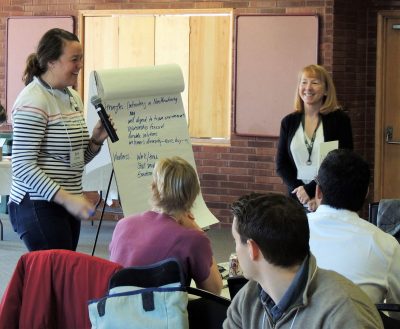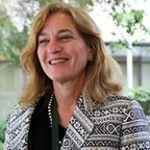
Team Science Workshop 2023
February 6–10 | 11:30–1:30 PST Daily
Event Details
Dates: February 6–10, 2023
Time: 11:30am–1:30pm PST, daily
Where: Online via Zoom
Cost: Free
Registration: Register as a team. Registration opens November 28.
Workshop Resources
Day One
Day 1 Video
Day 1 Prework:
Read 6 Conditions Framework LINK
Day 1 Handouts:
6 Conditions Report Card/Diagnostic Checklist LINK
Day 1 Additional Resources:
Google article LINK
Liberating Structures LINK
Individual and Team Competencies in Translational Teams (article) LINK
ITHS Team Science Seminar Series LINK
Day 1 Slide Presentation:
Day Two
Day 2 Video
Day 2 Prework:
Read Lean Project Management article LINK
Day 2 Handouts:
Research Study Charter Blank LINK
Research Study Charter – Facilitator Version LINK
Roles & Responsibilities handout LINK
Roles & Responsibilities Example handout LINK
Day 2 Additional Resources:
Team Roles didactic presentation LINK
Setting the Foundation for Successful Meeting Management (video) LINK
Day 2 Slide Presentation:
Day Three
Day 3 Video
Day 3 Prework:
Read or listen to “What Does Modern Prejudice Look Like?” LINK
Complete the Thomas Kilmann Instrument (TKI) (see email and participant packet for link)
Complete the Social Style Self-Perception Profile (see email and participant packet for link)
Complete the Emotional Intelligence Questionnaire LINK
Day 3 Handouts:
None
Day 3 Additional Resources:
“When Interpersonal Skills Take Off, Results Soar” LINK
Implicit Association Test LINK
Tracom Resources (for Social Style Self-Perception Profile) LINK
Emotional Intelligence Leadership ****
Harvard Negotiation Project LINK
Cognitive Bias Codex LINK
A map of cognitive biases in decision making LINK
Emotional Intelligence Leadership (article) LINK
Thomas Kilmann Conflict Mode Instrument Information LINK
Day 3 Slide Presentation:
Day Four
Day 4 Video
Day 4 Prework:
None
Day 4 Handouts:
Welcome letter outline LINK
TRIZ worksheet LINK
Day 4 Additional resources:
Bennet Welcome Letter paper LINK
NIH Example of Welcome Letter LINK
Interprofessional Team Writing Toolkit LINK
ITHS Team Science Seminar Series Session 10: Multiple-PI Collaborative Grant Applications LINK
University of Minnesota Office for Conflict Resolution (example welcome letters) LINK
NIH Office of the Ombudsman (questions for collaborators) LINK
Day 4 Slide Presentation:
Day Five
Day 5 Video
Day 5 Prework:
Watch TED Talk, “Great leadership only comes down to two rules” LINK
Watch video, “Empathy: The Human Connection to Patient Care” LINK
Day 5 Handouts:
Empathetic Communication Skills LINK
Next Step Template LINK
Day 5 Additional resources:
HBR article, “What Good Feedback Really Looks Like” LINK
Resource for preparing to give feedback from the National Health Service (NHS) Leadership Toolkit LINK
What Having a “Growth Mindset” Actually Means (article) LINK
What is the Team Science Workshop?
The Team Science Workshop is a free, interactive training intended for interdisciplinary research teams working on a translational research project/study or within a research center. Teams will learn the theory and practice of team science. This workshop will be offered virtually 2 hours per day over a 5-day period.
The workshop will take place every day from 11:30-1:30 pm (PST) Monday, February 6 through Friday, February 10. Each day, we will focus the first 90 minutes on team science education and training, and the final 30 minutes on team working sessions.
Training content will be tailored to address and solve specific challenges identified by the participating teams. By attending the Team Science Workshop, your team will build stronger relationships and acquire strategies and tools to help you become more efficient and effective in your work together.
Topics that may be covered include:
- Teamwork and team Processes
- Awareness and adaptability of Social Styles and modes for addressing conflict
- Lean Project Management (e.g., project organization, goal setting, planning)
- Giving and receiving feedback
- Meeting and time management
- Communication and listening skills
- Leadership skills
What Do Past Attendees Have to Say?
 “Attending the Team Science training made such a difference. I am a new leader and was struggling with how to facilitate a feeling of a team and working toward a common goal. Now the team feels more empowered and we are working together. [What I interpret as] the feeling of being part of a team has made each of them show more commitment to the study and also more open to share ideas. I am telling everyone about this training, it was like water to wine. ”
“Attending the Team Science training made such a difference. I am a new leader and was struggling with how to facilitate a feeling of a team and working toward a common goal. Now the team feels more empowered and we are working together. [What I interpret as] the feeling of being part of a team has made each of them show more commitment to the study and also more open to share ideas. I am telling everyone about this training, it was like water to wine. ”
-Daniela Luquetti, MD, PhD, Seattle Children’s Research Institute, Center for Developmental Biology and Regenerative Medicine
“I am still in awe of the impact that the training had on the members that directly participated in the workshop, in addition to members that were not in attendance. We learned a great deal about ourselves, as well as one another, and have adopted many of the tools/strategies into our day-to-day practices. Although we felt that we had been working well as a group, the education that we received through this formal training program truly pushed our team to function at a much higher level. Because we were able to hone in on strengths and special skill sets for each team member (beyond just our ‘role’ on the team) during the training, we all felt more empowered to exercise those skills (and delegate, when needed) – which elevates the functioning and productivity for the entire team.”
– Carrie Heike, MD, MS, Associate Professor, Department of Pediatrics, Director, Craniofacial Media Lab
…this formal training program truly pushed our team to function at a much higher level.
“We didn’t attend the training having any pre-existing issues that we wanted to resolve. Team training did at least two things for us. One, it forced us to do an outline of the key milestones, which forced us to talk to who’s doing what. Two, it acted as a forcing function for the team to get together. Having those days in person really helped with team building. I think our team is able to collaborate more effectively because of the training.”
– Gary Hsieh, PhD, Associate Professor, Human Centered Design & Engineering
Team Requirements
You should apply for the Team Science Workshop if your team:
- Is an interdisciplinary research team with a specific translational research project
- Has a minimum of 3 team members who can commit to attending the full 5-day online training
- Has the capacity to complete about 20-60 minutes of pre-work before each session
While space is limited for this training, all ITHS members are encouraged to register their teams to attend. Space will be offered on a first-come, first-served basis for teams who meet the above requirements.
Registration
Registration will be open November 28, 2022–January 6, 2023.
About the Trainers
 Brenda Zierler, PhD, RN, FAAN serves as a professor in the UW Department of Biobehavioral Nursing & Health Informatics and as Director of Research, Training and Faculty Development for the UW Center for Health Sciences Interprofessional Education, Research & Practice. Her research focuses on health systems/health services related to interprofessional (IP) collaborative practice (CP) to improve team functioning and patient and systems outcomes. Brenda co-facilitates a leadership and team science yearlong seminar for pre and post-doctoral trainees and early career faculty.
Brenda Zierler, PhD, RN, FAAN serves as a professor in the UW Department of Biobehavioral Nursing & Health Informatics and as Director of Research, Training and Faculty Development for the UW Center for Health Sciences Interprofessional Education, Research & Practice. Her research focuses on health systems/health services related to interprofessional (IP) collaborative practice (CP) to improve team functioning and patient and systems outcomes. Brenda co-facilitates a leadership and team science yearlong seminar for pre and post-doctoral trainees and early career faculty.
 Jennifer Sprecher, MS, BS IE, Executive Coach, Lean Six Sigma Black Belt. Ms. Sprecher is the Director of Strategy Development for the UW School of Nursing and has 5 years of experience and knowledge with team science training and coaching and over 20 years of experience with facilitation and lean project management. Ms. Sprecher works within organizations by implementing concepts of Lean Project Management, measurement systems, change management, benchmarking, team problem solving and leadership coaching to improve organizational performance and workplace satisfaction by increasing engagement. Through application of leadership and team coaching concepts and various assessments, she helps departmental chairs, technical and operational leaders and teams achieve their desired goals and vision.
Jennifer Sprecher, MS, BS IE, Executive Coach, Lean Six Sigma Black Belt. Ms. Sprecher is the Director of Strategy Development for the UW School of Nursing and has 5 years of experience and knowledge with team science training and coaching and over 20 years of experience with facilitation and lean project management. Ms. Sprecher works within organizations by implementing concepts of Lean Project Management, measurement systems, change management, benchmarking, team problem solving and leadership coaching to improve organizational performance and workplace satisfaction by increasing engagement. Through application of leadership and team coaching concepts and various assessments, she helps departmental chairs, technical and operational leaders and teams achieve their desired goals and vision.
Erin Abu-Rish Blakeney, PhD, RN, is co-lead of the UW ITHS Team Science Core and a Research Assistant Professor in the Department of Biobehavioral Nursing and Health Informatics at the UW School of Nursing. Dr. Blakeney’s program of research focuses on how teams work together and how their teamwork influences the production of new knowledge and translation of research into practice along the entire classroom to bench to bedside spectrum. She has nearly 15 years of experience developing, implementing, and evaluating team approaches to interdisciplinary education, healthcare, and research.



